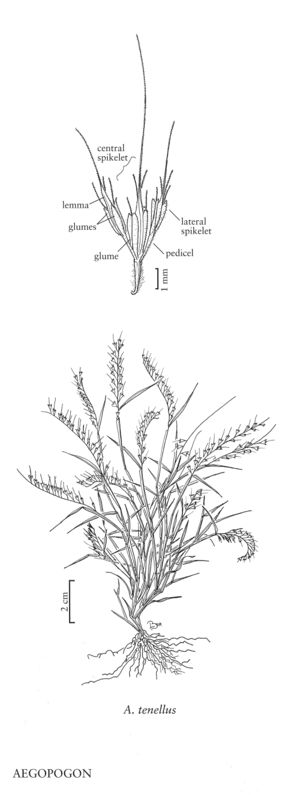Difference between revisions of "Aegopogon tenellus"
FNA>Volume Importer |
FNA>Volume Importer |
||
| Line 7: | Line 7: | ||
|synonyms={{Treatment/ID/Synonym | |synonyms={{Treatment/ID/Synonym | ||
|name=Aegopogon tenellus var. abortivus | |name=Aegopogon tenellus var. abortivus | ||
| − | |authority= | + | |authority= |
| + | |rank=variety | ||
}} | }} | ||
|hierarchy=Poaceae;Poaceae subfam. Chloridoideae;Poaceae tribe Cynodonteae;Aegopogon;Aegopogon tenellus | |hierarchy=Poaceae;Poaceae subfam. Chloridoideae;Poaceae tribe Cynodonteae;Aegopogon;Aegopogon tenellus | ||
| Line 20: | Line 21: | ||
-->{{Treatment/Body | -->{{Treatment/Body | ||
|distribution=Ariz. | |distribution=Ariz. | ||
| − | |discussion=<p>Aegopogon tenellus usually grows between 1550-2150 m in shady habitats of moist canyons, but it is sometimes found along roadsides and in other open areas. Its range extends from southern Arizona into northern South America. In some plants, the lateral spikelets are reduced (Aegopogon tenellus var. abortivus (E. Fourn.) Beetle), but such spikelets (and central spikelets with reduced awns) are also found in plants with normal spikelets, so taxonomic recognition is not warranted.</p> | + | |discussion=<p><i>Aegopogon tenellus</i> usually grows between 1550-2150 m in shady habitats of moist canyons, but it is sometimes found along roadsides and in other open areas. Its range extends from southern Arizona into northern South America. In some plants, the lateral spikelets are reduced (<i>Aegopogon tenellus</i> var. abortivus (E. Fourn.) Beetle), but such spikelets (and central spikelets with reduced awns) are also found in plants with normal spikelets, so taxonomic recognition is not warranted.</p> |
|tables= | |tables= | ||
|references= | |references= | ||
| Line 29: | Line 30: | ||
-->{{#Taxon: | -->{{#Taxon: | ||
name=Aegopogon tenellus | name=Aegopogon tenellus | ||
| − | |||
|authority=(DC.) Trin. | |authority=(DC.) Trin. | ||
|rank=species | |rank=species | ||
| Line 36: | Line 36: | ||
|basionyms= | |basionyms= | ||
|family=Poaceae | |family=Poaceae | ||
| − | |illustrator=Linda A. Vorobik | + | |illustrator=Linda A. Vorobik;Karen Klitz |
| + | |illustration copyright=Utah State University | ||
|distribution=Ariz. | |distribution=Ariz. | ||
|reference=None | |reference=None | ||
| Line 42: | Line 43: | ||
|publication year= | |publication year= | ||
|special status= | |special status= | ||
| − | |source xml=https:// | + | |source xml=https://jpend@bitbucket.org/aafc-mbb/fna-data-curation.git/src/f50eec43f223ca0e34566be0b046453a0960e173/coarse_grained_fna_xml/V25/V25_911.xml |
|subfamily=Poaceae subfam. Chloridoideae | |subfamily=Poaceae subfam. Chloridoideae | ||
|tribe=Poaceae tribe Cynodonteae | |tribe=Poaceae tribe Cynodonteae | ||
Revision as of 21:38, 16 December 2019
Plants annual; tufted. Culms 2-30 cm, bases often prostrate or decumbent, strongly branching. Sheaths glabrous or sparsely hirsute; ligules 0.7-1.5 mm, lacerate; blades 1-7 cm long, 1-2 mm wide, glabrous or puberulent. Panicles 2-6 cm. Lateral spikelets 1.5-2.3 mm, on 1-1.3 mm pedicels; central spikelets 2.5-3.2 mm, on 0.3-0.6 mm pedicels. Glumes 1.3-1.8 mm, flabellate, lobes rounded, awns 0.1-0.6 mm; lemmas 2.5-3.2 mm, central awns 3-8 mm, lateral awns to 1 mm; anthers 0.5-0.8 mm. 2n = 20, 60.
Discussion
Aegopogon tenellus usually grows between 1550-2150 m in shady habitats of moist canyons, but it is sometimes found along roadsides and in other open areas. Its range extends from southern Arizona into northern South America. In some plants, the lateral spikelets are reduced (Aegopogon tenellus var. abortivus (E. Fourn.) Beetle), but such spikelets (and central spikelets with reduced awns) are also found in plants with normal spikelets, so taxonomic recognition is not warranted.
Selected References
None.
